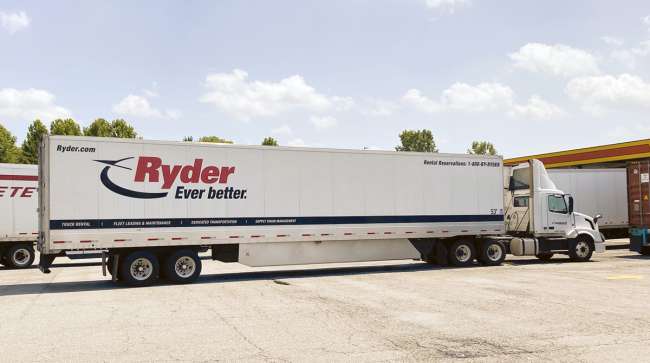Staff Reporter
Ryder Q3 Profit Slides Even as Acquisitions Boost Revenue

[Stay on top of transportation news: Get TTNews in your inbox.]
Profit at Ryder System Inc. fell in the third quarter as ongoing freight market weakness continued to hurt rental demand and vehicle sales, the company said Oct. 24.
Revenue for the Miami-based company, however, climbed in the most recent quarter, driven by its February and October 2023 acquisitions of Cardinal Logistics and Impact Fulfillment Services.
Ryder, which ranks No. 6 on the Transport Topics Top 100 list of the largest for-hire carriers in North America and No. 8 on the TT Top 100 list of the largest logistics companies, posted a profit of $142 million, or $3.24 per diluted share, in Q3, down 11.8% from $161 million, $3.47, in the year-ago period.
Revenue rose 8.6% to $3.17 billion in Q3 from $2.92 billion in the prior-year period, with the company’s dedicated transportation solutions unit seeing a 41% jump in revenue to $633 million from $448 million because of non-organic growth.
Ryder acquired Concord, N.C.-based Cardinal Logistics on Feb. 1 for an undisclosed sum. Cardinal Logistics ranked No. 51 on the for-hire TT100 and No. 63 on the logistics Top 100 in 2023, prior to the deal.
The company’s supply chain solutions segment saw revenue rise 10% year over year to $1.317 billion from $1.194 billion in the year-ago period, also driven by the acquisitions.
“Ryder’s solid third-quarter performance reflects continued execution of our balanced growth strategy,” said Ryder CEO Robert Sanchez. “Earnings growth in our contractual lease, dedicated, and supply chain businesses remains the key driver of outperformance relative to prior cycles.
“Although we did not see a recovery of market conditions in used vehicle sales and rental during the quarter, we delivered comparable EPS in line with our forecast,” he said.
Looking forward, Chief Financial Officer John Diez said Ryder expects earnings growth in the fourth quarter as a result of its contractual portfolio.
However, Ryder does not expect a recovery in freight conditions by the end of 2024, he said.
McLeod Software CEO Tom McLeod explores the potential for artificial intelligence to boost efficiency and build resilience. Tune in above or by going to RoadSigns.ttnews.com.
“Conditions continue to bounce along the bottom,” he told analysts during the company’s quarterly earnings call, which the weakness in rental and used vehicle sales reflects.
Ryder’s rental and used vehicle sales operations are part of the company’s largest unit — fleet management solutions.
FMS posted a 1% decrease in revenue in Q3 to $1.470 billion from $1.487 billion a year earlier.
Revenue from commercial rentals in the most recent quarter totaled $251 million, down 15% from $293 million in the year-ago period. Through the first nine months of 2024, rental revenue fell 19% year on year to $726 million from $898 million.
Rental power-fleet utilization averaged 71% in Q3, compared with 75% in the same period 12 months earlier, on a 7% smaller average power fleet.
The company sold 4,700 used vehicles in Q3, down 28% compared with 6,500 in the year-ago period. In the nine months that ended Sept. 30, Ryder sold 17,200 used vehicles, up 1% from 17,000 in the same period in 2023.
Want more news? Listen to today's daily briefing above or go here for more info
Used tractor sales prices in the most recent three-month period fell 22% year on year, while used truck prices fell 19% compared with Q3 2023, Ryder said.
Tractor sales revenue also fell compared with the second quarter as the prior three-month period saw newer vehicles sold, Diez told analysts.
Ryder’s used vehicle mix is shifting toward trucks and away from tractors, reflecting more supportive demand and pricing, Diez added.
The FMS unit did benefit from an improved performance at its ChoiceLease leasing and maintenance program, where revenue rose 7% year over year to $857 million from $799 million.
ChoiceLease saw a 4% year-on-year climb in its average fleet count in Q3 to 136,200 from 130,500.
Still, executives warned during the call, private fleets are not growing their fleets as fast as they were and some leasing customers are renewing fewer vehicles.





